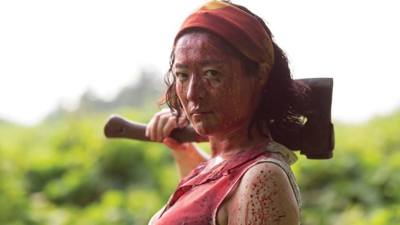
In the vast industrial mystery of 20th-century Japan’s mechanical innovations, a small film crew has gathered to make a low-budget zombie film. Lives to be lived, blood to be spilled, and the secrets of the military-industrial complex ready to claw their way up from shallow graves. But after a visceral confrontation between the director — played by Takayuki Hamatsu and presented as an unbalanced egomaniac prone to pettiness and score-settling, chaos in a floral shirt of turmoil — and the lead actors, the filmmakers realize that they are in the midst of an actual zombie outbreak. Which is a genre trope, but also a kind of an inevitability in contemporary found-footage cinema. One Cut of the Dead — which shows Sept. 17 at the Belcourt as part of the Peripheral Visions series — gets weirder, funnier and sweeter as well, because when we hit the first set of end credits about 40 minutes in (there are three), the realization sets in: There weren’t any edits.
Single-take cinema is a frustrating beast, because the line that divides “technical exercise with elevated emotional stakes because of physical difficulty and emotional continuity” from “ostentatious wankery” is very hard to perceive until you’ve passed it. Long-take narrative is an incredibly difficult approach to pull off, because it more often than not shatters its own illusion — its accomplishment draws attention to itself, killing the unspoken détente between the filmmaker and the audience. To put it another way, the line between interesting long-take cinema (like Béla Tarr’s Werckmeister Harmonies and Mike Figgis’ Timecode) and swinging-dick digitally massaged peacocking (Birdman) is marked by whether you’d ever want to watch it again. And here we have the makeup artist/self-defense enthusiast/badass mom Nao (Harumi Shuhama), who is so devoted to what’s going on that she absolutely refuses to let any of the plot or tech aspirations get in the way of the story, which is the Joe Bob Briggs-iest thing anyone in a film can do.
It’s after that first set of credits when we time-slip back a month. There we see how the opening sequence came together, getting to know all the involved parties and circumstances that brought them into the make of an experimental new television special for Japan’s nascent Zombie Network. This longer sequence is simultaneously a behind-the-scenes parallel, a dishy on-set diary and a director’s commentary all synthesized into something very special. The way it unfolds allows for the enriching experience of a second-time viewing that just happens to arrive while you’re watching the film for the first time.
A massive arthouse success in Japan and a loving testament to the ramshackle miracle behind any movie getting made, One Cut of the Dead is a scrappy, sincere take on the zombie film, and perhaps the only pure and decent thing to be found at the box office. Eschewing the right-wing fantasies of the majority of modern zombie narratives allowing for consolidation of absolute power and wielding Life and Death over those who disappoint you, this is a film about cooperation and foibles. As with its sister foreign-language horror orphan Tigers Are Not Afraid, American audiences are finally getting to see this movie in theaters thanks to Shudder, the horror-curated streaming arm of AMC networks. So here, at least, is some hope for streaming and theatrical playing nice together.
One Cut of the Dead is, oddly enough, a heartwarming family picture, provided your family is OK with occasional fits of organ eating and zombie mayhem. Horror theorist and podcaster Rebekah McKendry refers to it as “the Noises Off of horror,” which should buttress the foundation that this film can satisfy audiences in the mood for something different. We’re also talking about a cogent found-footage autocritique and a workplace dramedy that plays with genre tropes like a particularly inventive child in an infinite sandbox. It is the ideological and artistic opposite of The Walking Dead empire, which can honestly go fuck itself both for fulfilling the portent that David Wong’s This Book Is Full of Spiders predicted as well as disrespecting Kim Dickens — which you should never, ever do.
What we do for family — not battling the undead or finding the strength to slaughter our loved ones who’ve been enzombied, but rather working shitty jobs, battling addiction and trying to find a way to communicate — is the struggle of humanity right now. It seems like far too many people in power want apocalyptic, end-of-days fascism, and this film responds with a rallying cry of “Fuck that!” Despite using fairly played-out elements like zombie outbreaks and long-take cinema, One Cut of the Dead is fresh, funny and blissfully alive. It delivers everything fans of horror and the fantastic could want, and it could very well be the inspiration that the next wave of horror masters is waiting for. It’s a testament to the lovable, ramshackle band of freaks it takes to make a film. Any film. Truthfully, every film.





